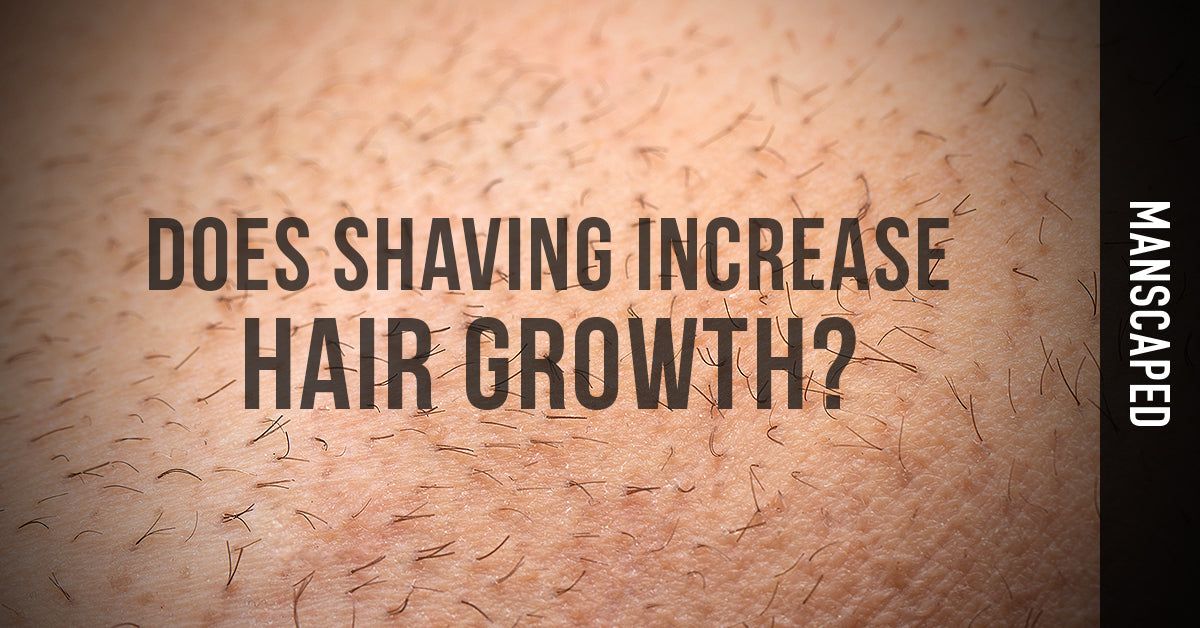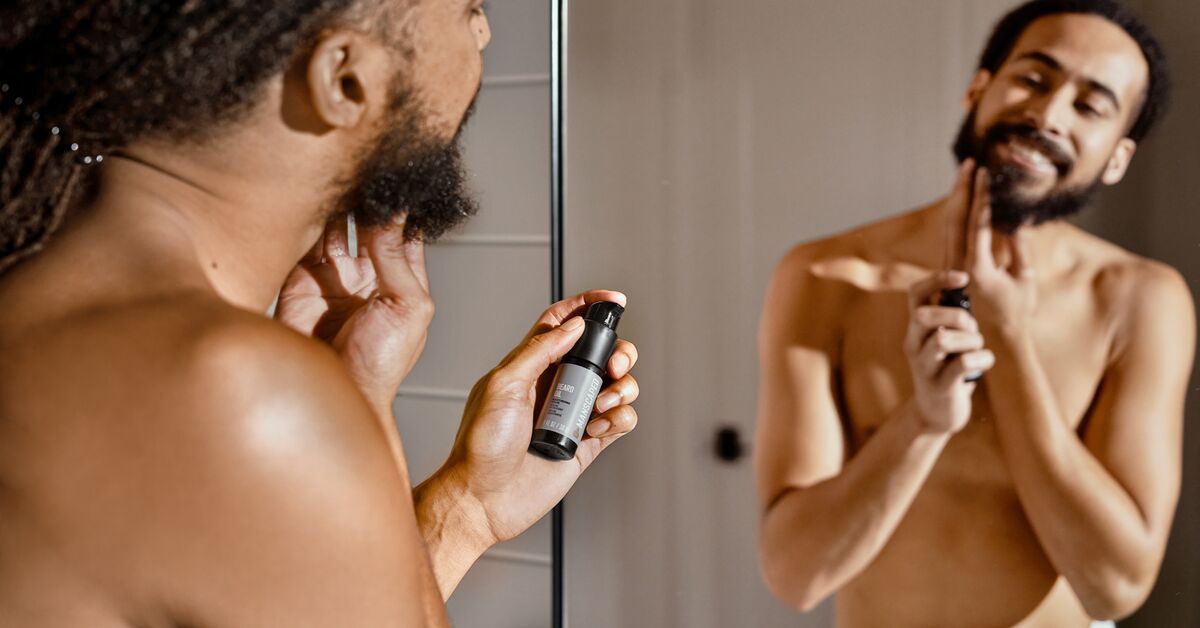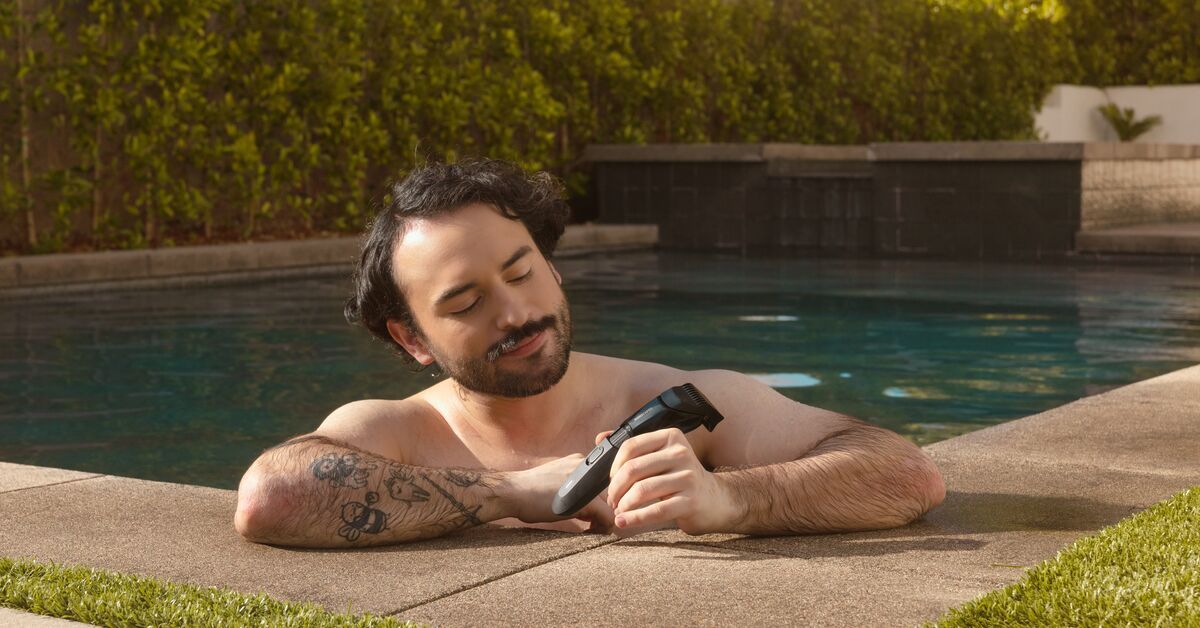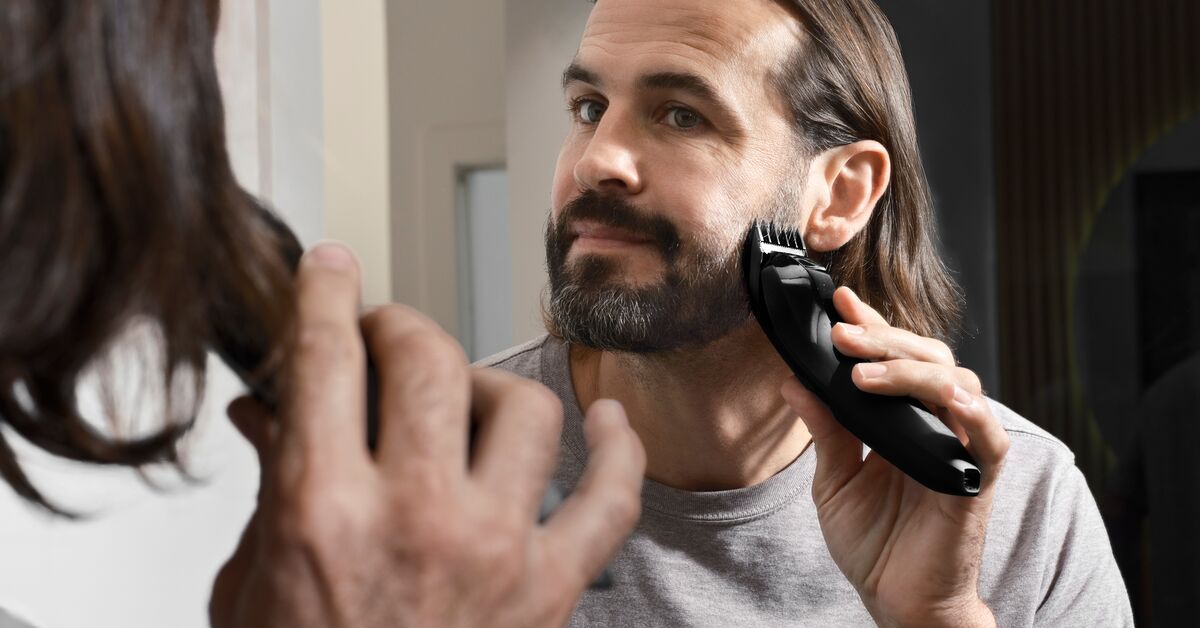
It's long been thought that shaving speeds up hair growth, making it thicker, darker, and fuller along the way. Is this fact, or is this fiction? Like many things you'll read on the internet, you can probably find stories to support either case, depending on which side of the fence you want to believe. With this in mind, we took our researching skills to the cyber streets to come up with the truth around your body's production of hair.
The short answer to the question, "Does shaving increase your hair growth?" is no. But why? Let's find out!

Does shaving make your hair grow back thicker?
In short, no. This old wives' tale is just that: a tale. While shaving can give the appearance of thicker hair, the act of shaving does not increase the number or size of hair follicles in your skin. That's true for your head, face, pubes, and the rest of your body. If the number and sizes of the follicles do not increase, hair density cannot increase. Instead, shaving cuts your hair back down to the thickest part (right at the root). If you let it grow out again, it will be the same thickness as before (not accounting for biological development like puberty). This is the result of new hair growth looking different at first, as unshaven hair is finer after growth vs. the coarser base that begins growing. The coloring of the hair may also be slightly different, as newly grown hair hasn’t been exposed to any natural elements such as sun or soaps and chemicals.
While shaving does not make your hair grow thicker, it may also lead to other side effects that many people think is the result of shaving their hair including:
- Skin irritation
- Razor burn
- Contact dermatitis
- Cuts
- Ingrown hairs
- Blisters
- Pimples
Does shaving make your hair grow back faster?
It may feel like it, but this is not the case. It feels authentic because most of us start shaving during puberty. For guys, hair growth will usually accelerate until you're around 25. After that, it levels off, although some changes can still happen.
None of that is dependent on your use of a razor. The idea that shaving makes your hair grow faster is a misconception, and the reason for the phrase "correlation does not equal causation." It's common for your hair growth to be accelerating while you're learning to shave. That does not mean that shaving causes growth.
While shaving does not make hair grow faster, it’s important to understand the different stages of hair growth. It takes about a month for body hair to reach its full length. When you shave, you’re not actually removing any hair under the skin line within the hair follicles which means that it's impossible to affect thickness and speed of growth as the hair you’re shaving is technically dead already once it’s at the surface.
As for body hair, it can grow at different rates depending on the person and the area of your body that is being shaved. For example, head hair grows at a faster rate than body hair does, so your shaving regimen might be different for these different areas of the body.
Does shaving cause your hair to grow back darker?
The answer to this question is a little grayer (pun intended). Shaving doesn't cause hair to grow darker, but it can change the color of your hair — sort of. Here's how it works. Sunlight can bleach your hair and make it lighter. So, any hair you have that gets lots of sun will get lighter the longer it lasts. When you shave, you get rid of the bleached hair and only have the unbleached, darker hair showing. In that way, shaving can leave your hair looking darker, but it isn't changing the natural pigmentation.
It's worth noting that this only applies to hair that sees sunlight. For most guys, pubes are excluded.
What other hair removal methods can I use to keep hair from growing back so quickly?
While shaving does not accelerate hair growth, it's not always the best way to extend the period between necessary grooming sessions. If you want more time before you have to shave, some alternatives work— some better than others. The key is to go deeper and use hair removal that gets below the surface of the skin; this includes waxing, depilatories, plucking, and laser hair removal. Whether you will want to try any of these around your delicate man parts is another discussion entirely.
Puberty & body hair: How it contributes to the myth
It's possible that the myth about hair getting thicker as a result of shaving starts with pubescent boys and girls. But in reality, does shaving increase hair growth? Let's give a closer look. When adolescents and teenagers start shaving, it seems like hair starts growing faster and thicker after each shave. While that's probably true, it's not a causal relationship; it's just a coincidence in timing. Hair starts growing more as you age.
Hair grooming more as you age is true for all sorts of body hair. 17-year-old boys might only have a few chin hair sprouts, which they can sometimes count on one hand. That same man at 27 years old might be able to grow a full, luscious beard. That's not because he's been shaving his face for ten years; it's simply because time and human development have made that beard possible over a decade of becoming an adult. The same is true for women who shave their legs (here's how to shave your legs with The Lawn Mower® 4.0); when they first start shaving, it might seem like they have stubble appearing more and more quickly, but that has nothing to do with the razor itself. It simply means they started shaving at a time when the body was ready to start massaging those body hair follicles into action.
Of course, during puberty, dark, coarse, and curly hair starts to appear on the body parts that are generally hidden from the public. In some instances, boys and girls start shaving this hair, which can also make it seem like the sudden growth is the direct result of a razor's application. In reality, this simply isn't true; it just happens to be that the time we begin shaving often coincides with the periods in which our bodies ramp up for body hair growth.

Trimming, shaving, & thicker body hair: What's the correlation?
Now that we have the myth surrounding puberty out of the way let's talk about how ongoing trimming and shaving can make it seem like body hair is growing in at a faster, thicker rate.
When you let your hair grow au naturale, each piece of hair grows at a different speed than its buddies; this means every hair is a different length. Where there are shorter hairs, that patch of the body can seem balder than the places where the hairs have grown long and thick. Additionally, body hair tends to be a bit thicker near the root and often gets thinner as it grows out; this might be because the hair splits or begins shedding the cells that make it up as it hangs around longer. In any case, once you put a trimmer to it, you level out the playing field, in effect taking away the disparities that can make some spots look thinner than others. Plus, when you trim down close to the skin, you're exposing the thickest part of the follicles, which can automatically make it look like your trimming task is the reason your hair growth is suddenly exponentially thicker. In a way, that's true because the trimmer is the reason you're seeing thicker hair, but it's not the cause of the thickness. It simply exposed the hair's characteristics that were there all along, removing the excess tresses that made it look like parts of your body hair were more abundant than others.
It's a little ironic, isn't it? Sometimes, the more body hair you have, the thinner it can seem overall. By trimming and shaving, you remove unhealthy hair and enable everything to start growing (and stay growing) at the same pace, ensuring a healthier look overall. The same is true for the hair on your head if you think about it. If you get a good trim every four to six weeks, your hair will look far thicker and healthier than it would if you were to let it grow for years without any maintenance. That's because regular trims enable you to keep it even while simultaneously removing the unhealthy hair that can leave your look lackluster.
Tools like The Lawn Mower™ 4.0 trimmer from MANSCAPED™ can help you keep your body hair on an even keel so it's always presentable and ready for your partner, no matter when the opportunity should arise.
Light vs. dark hair: Is there a difference in thickness?
This is a multi-faceted question that can go in many different directions. First, are we talking about beard hair, head hair, or the hair down there? Second, are we examining one particular person's body hair, or is this a general question to which we can apply a generic answer? Well, there are no easy answers, so let's explore some options.
First of all, if you're talking about hair that's exposed to light (such as your beard), shaving may make it look like your hair is growing in thicker. Why? Because as hair is exposed to the sun, it tends to get lighter in color. On the surface, that can make it look like it's thinner. The brand new hair that hasn't been exposed to the elements is likely to be darker, and as such, will often look thicker.
Of course, your hair down below doesn't have exposure issues, so what else could cause the difference between thick and thin, dark versus light; this is where genetics comes into play. People who have lighter hair often have thinner follicles. Even hair that's hidden behind the clothes that cover the nether regions can come in different colors. Sure, it's often coarser and thicker than other body hair, but someone who has, say reddish pubes, may not have as thick of a bush as someone who grows in a lower region of lush dark tresses.
Exploring the growth rates of pits, pubes, and facial hair
Did you know that the hair on your body grows at basically the same rate? You've probably never really thought about it, particularly if we're talking about regions you don't trim or shave regularly, but it's true. While many people think pubic hair grows faster than the hair on the rest of their bodies, that's not the case. In reality, you have a smaller landscape (and more readily available view) of the hair that's down there. Plus, the hair on your private parts is shorter than other body hair, which means it's more noticeable when it starts to grow out.
What does this mean? Simply put, if you buzz the hair below the waist, you'll notice its regrowth more obviously than you would the hair on your head because there's just not a lot of hair down there. If you were to completely shave off your head hair, you'd probably notice a similar regrowth. This is true for every part of the body that grows hair. You might hear your girlfriend complain about shaving her legs or armpits all the time, while she only goes to the salon every six weeks. That's because the portions of her body that she's shaving have a smaller landscape, and she's trying to keep the hair away. Conversely, her head is filled with follicles that she's trying to keep lush and long (or at least, long-ish), so she's not concerned with the quarter-inch of growth that can happen in a short amount of time if she doesn't tend to her parts properly.

Body hair growth cycle
Every hair on your body grows in a three-stage cycle:
- Growth
- Stagnation
- Falling out
Pubic hair has a far shorter cycle than, say, the hair on your head. Pubic hair only hangs around for about a month or so before it falls out and finds its way into the trash can or shower drain; this is true for other non-head body hair, as well. Generally speaking, body hair that's not coming from your scalp will grow for about 30 to 44 days. The hair on your head follows the same process, but the follicles are far more resilient, often growing for up to six years before they find their way into the confines of your hairbrush. Of course, you're probably cutting it long before it grows to its full potential, but this explains why your pubic hair will never, ever reach the lengths of your head hair, no matter how neglectful you might be of your male grooming efforts.
This is another reason it seems like pubes, pits, and beard hair seem to be on the fast-track to growth, even when they're growing at the same rate as all the rest of your hair. The follicles fall out far quicker, which means they're regenerating at a quicker rate than the hair up there. Your head hair is growing just as quickly, but it doesn't need to be replaced because you're simply cutting it at intentional intervals rather than watching it grow anew from the roots.
Interesting facts about body hair
Now that we've talked about the facts and fiction of body hair let's talk about some fun facts involving human (and animal) fur.
1.) There are three types of body hair
That's right; all body hair is not created equal.
- Lanugo hair covers newborn human babies. It falls out shortly before or just after birth.
- Vellus hair is short, fine, and lightly colored hair covering many parts of your body, like your arms. The hairs sprout from follicles that aren't connected to oil glands.
- Terminal hair is the long, thick, and dark hair that grows on your head and elsewhere.
2.) Pubic hair exists to eliminate friction
You don't have to leave a huge bush on your nether region, but if you have sensitive skin, it can help to trim your southern parts without fully removing the hair that grows down there. That's because pubic hair inherently helps create a buffer against the friction that can happen when you're bumping uglies in the bedroom. Keep this in mind if you've found yourself asking, "Should I groom?"

3.) You can shed up to 150 hairs a day
While most people shed 100 to 150 hairs a day, they also regrow the same amount. Your body understands the circle of life when making hair follicles that keep the body protected. According to Medicaldaily.com, most people cycle through all 100,000 hairs they have every three years, replacing them daily as they fall out.
4.) 69% of men trim their pubes
Approximately 69% of men report trimming their pubes. This number, perhaps unsurprisingly, correlates with a reported 70% of women who say they prefer that their partners take care of their pubes and keep them in good working order. On the other side of the numbers, 70% of men agree that their partners should do their best to keep their down-under parts properly procured.
If you've wondered whether your hair is growing faster when you shave it or not and asked yourself, "does shaving increase hair growth ?", we hope this dispels any myths you might have had. While it can certainly seem like pubic, beard, and underarm hair is growing at an increased rate, the reality is that you're just working with less real estate than, say, the hair on your head.
Now that you know how your hair works get yourself a body groomer and trim up those tresses.
03.10.22
Share

Featured Articles
- Your Favorite Ball Deodorant. Now with a New Scent: Perservere.MANSCAPED® + TCS for Testicular Cancer Awareness MonthIntroducing The Lawn Mower® 5.0 Ultra TCS Special Edition and TCS Ball Hero BundleThe Dome Shaver™ Pro vs. The Dome Shaver™ Plus: Which Should You Choose?The Chairman™ Pro vs. The Chairman™ Plus: Which Should You Choose?




